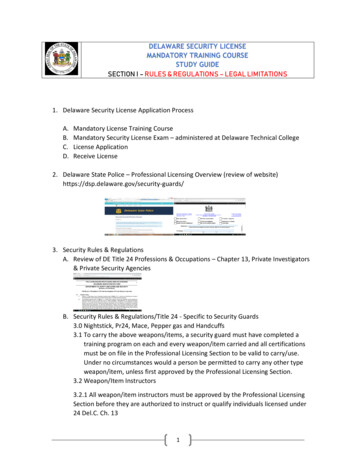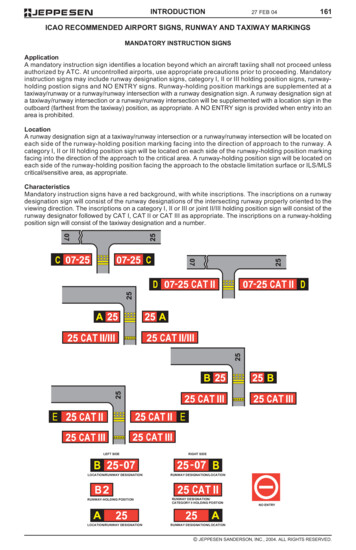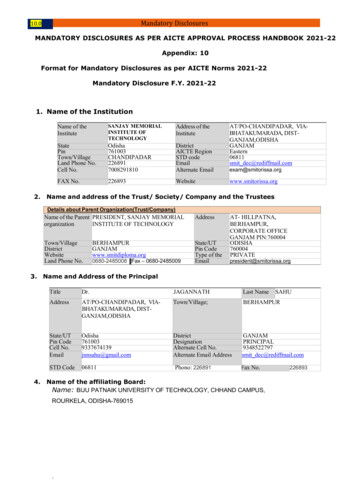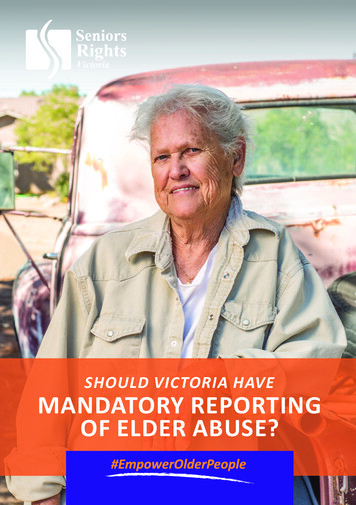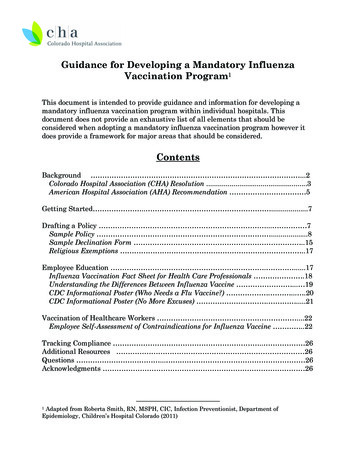
Transcription
Guidance for Developing a Mandatory InfluenzaVaccination Program1This document is intended to provide guidance and information for developing amandatory influenza vaccination program within individual hospitals. Thisdocument does not provide an exhaustive list of all elements that should beconsidered when adopting a mandatory influenza vaccination program however itdoes provide a framework for major areas that should be considered.ContentsBackground .2Colorado Hospital Association (CHA) Resolution .3American Hospital Association (AHA) Recommendation 5Getting Started . .7Drafting a Policy . 7Sample Policy .8Sample Declination Form .15Religious Exemptions .17Employee Education . .17Influenza Vaccination Fact Sheet for Health Care Professionals .18Understanding the Differences Between Influenza Vaccine . 19CDC Informational Poster (Who Needs a Flu Vaccine?) . . .20CDC Informational Poster (No More Excuses) . .21Vaccination of Healthcare Workers .22Employee Self-Assessment of Contraindications for Influenza Vaccine .22Tracking Compliance . 26Additional Resources 26Questions . 26Acknowledgments 26Adapted from Roberta Smith, RN, MSPH, CIC, Infection Preventionist, Department ofEpidemiology, Children’s Hospital Colorado (2011)1
BackgroundThe Centers for Disease Control and Prevention (CDC) recommends that healthcarepersonnel and person in training for healthcare professions should be vaccinatedannually against influenza. Despite this recommendation, vaccination ratesamongst healthcare personnel remain inconsistent. Data collected from Coloradohospitals in March 2011 indicates that vaccination rates range from 60-90%.In recent years, there has been a significant effort to increase vaccination amongsthealthcare personnel. Various national accrediting and professional organizations,including the Infectious Disease Society of America (IDSA) and Association forProfessionals in Infection Control and Epidemiology (APIC), support mandatoryvaccination policies. In addition, conversations about legislative and/or regulatorymandates have increased in incidence, especially in Colorado.Colorado Hospital Association recognizes that Colorado hospitals and healthsystems are committed to patient safety. Vaccination of healthcare workers againstinfluenza not only protects patients and their families, but also protects ourvaluable workforce against illness. Similarly, CHA believes that a proactive,voluntary response to conversations related to legislative and regulatoryrequirements is a more optimal solution and one that may lessen or eliminate theneed for prescriptive mandates.Therefore, CHA put before its Board of Trustees a resolution in support of requiringannual influenza vaccinations for all healthcare personnel.“All CHA member hospital and health systems should adopt a mandatoryinfluenza policy and provide influenza vaccination to all healthcare personnelsuch that all healthcare personnel are required to provide: 1) annualdocumentation of influenza immunization; OR 2) documentation from alicensed physician indicating evidence-based medical contraindicationagainst influenza vaccination AND be required to wear a surgical mask at alltimes while on the premises of the health care facility.Documentation is required to be part of the healthcare personnel record andevaluated annually for applicability. In the event that healthcare personneldo not receive an influenza vaccination annually due to evidence-basedmedical contraindication, the healthcare personnel should be required towear a surgical mask.”This resolution was unanimously approved by CHA Board of Trustees on May 20,2011. Similarly, American Hospital Association recently endorsed their support ofmandatory vaccination of healthcare workers and encouraged hospitals to considerimplementing this important policy within their institutions.Page 2 of 26
Colorado Hospital Association Resolution in Support of RequiringAnnual Influenza Vaccinations for all Healthcare PersonnelWHEREAS, Influenza is a contagious respiratory illness caused by influenzaviruses that can cause mild to severe illness and at times can lead to death;WHEREAS, Healthy persons infected with the influenza can transmit it to peopleat higher risk for complications;WHEREAS, Complications of the influenza include bacterial pneumonia, earinfections, sinus infections, dehydration and worsening of chronic medicalconditions, such as congestive heart failure, asthma or diabetes;WHEREAS, Healthcare providers with medical conditions who are not vaccinatedagainst the influenza put patients and other healthcare workers at a higher riskof severe complications from influenza;WHEREAS, Healthcare personnel are defined as all persons whose occupationinvolves contact with patients or contaminated material in a healthcare, homehealthcare, or clinical laboratory setting. Healthcare personnel are engaged in arange of occupations, many of which include patient contact even though they donot involve direct provision of patient care, such as dietary and housekeepingservices. The term healthcare personnel includes not only employees of theorganization or agency, but also contractors, clinicians, volunteers, students,trainees, clergy, and others who may be in contact with patients.WHEREAS, The Centers for Disease Control and Prevention (CDC) recommendsthat healthcare personnel and persons in training for healthcare professionsshould be vaccinated annually against influenza. These include physicians,nurses and other workers in both hospital and outpatient-care settings, includingmedical emergency-response workers (paramedics and emergency medicaltechnicians) employees of nursing homes and long-term care facilities who havecontact with patients or residents;WHEREAS, Efforts to increase vaccination coverage among healthcare providersusing mandatory vaccination policies are supported by various nationalaccrediting and professional organizations, including the Infectious DiseasesSociety of America;
WHEREAS, the Colorado Hospital Association is committed to patient safety andquality healthcare for all Coloradans:Be it therefore resolved that the Colorado Hospital Association recommends thefollowing:All CHA member hospitals and health systems should adopt a mandatoryinfluenza policy and provide influenza vaccination to all healthcare personnelsuch that all healthcare personnel are required to provide: 1) annualdocumentation of influenza immunization; OR 2) documentation from a licensedphysician indicating evidence-based medical contraindication against influenzavaccination AND be required to wear a surgical mask at all times while on thepremises of the health care premises.Documentation is required to be part of the healthcare personnel record andevaluated annually for applicability. In the event that healthcare personnel donot receive an influenza vaccination annually due to evidence-based medicalcontraindication, the healthcare personnel should be required to wear a surgicalmask from the point of entry into the hospital and throughout the duration oftheir shift without exception.Approved by the CHA Board of Trustees on May 20, 2011
July 22, 2011AHA Endorses Patient Safety Policies RequiringInfluenza Vaccination of Health Care WorkersBACKGROUNDInfluenza is a highly contagious disease that can be spread before symptoms appearand results in about 150,000 hospital admissions and 24,000 deaths annually.Hospitalized patients are particularly vulnerable to the dangers of influenza becausetheir immune systems are often compromised by the illness that caused their admissionor the treatments they are undergoing. Vaccination of health care workers (HCWs) hasbeen shown to prevent illness and death in patients, and reduce influenza infectionsand absenteeism among HCWs. While the Centers for Disease Control and Prevention(CDC) has recommended annual vaccination of HCWs since 1981, only about half ofHCWs in the United States are immunized annually.In recent years, more and more hospitals and health care organizations are putting intoplace policies making seasonal influenza vaccinations mandatory for employees,affiliated medical staff, students, volunteers and contract workers as part of theircommitment to patient safety. These policies often have resulted in vaccination ratesabove 90 percent.Several key national professional organizations have endorsed mandatory policies forinfluenza vaccination as a condition of employment within health care facilities, includingthe Association of Professionals in Infection Control, American Academy of Pediatrics,Infectious Disease Society of America, National Patient Safety Foundation and Societyfor Healthcare Epidemiology of America. The American Medical Association supports“universal” influenza vaccination of HCWs, but leaves it to each facility to decidewhether or not a mandate is needed to achieve 100 percent vaccination coverage.While the resources needed to implement a mandatory policy are significant, especiallyin terms of financial and personnel resources, the benefits of protecting vulnerablepatients and reducing employee illness and absenteeism far outweigh the costs.Further, employee resistance can be overcome through careful education and opencommunication between hospital leadership and staff, as well as policies that permitcertain reasonable exclusions and allow employees who cannot receive influenzaAmerican Hospital Association1
vaccination to wear masks when they are in the presence of patients during theinfluenza season.AT ISSUEAHA members and staff spent time earlier this year discussing these issues in thecontext of the spring round of AHA Regional Policy Board meetings and with AHA’sCommittee on Health Professions. In April, taking into consideration the findings ofthese discussions, the AHA’s Board of Trustees approved the following new AHA policy:America’s hospitals are committed to protecting the health and well-beingof patients and staff. Evidence has emerged over the past few yearsclearly indicating that health care workers can unintentionally exposepatients to seasonal influenza if they (the workers) have not beenvaccinated, and such exposure can be dangerous to vulnerable patients.To protect the lives and welfare of patients and employees, AHA supportsmandatory patient safety policies that require either influenza vaccinationor wearing a mask in the presence of patients across health care settingsduring flu season. The aim is to achieve the highest possible level ofprotection.NEXT STEPSThe AHA will hold three conference calls featuring speakers from hospitals that haveimplemented mandatory vaccination policies, with a focus on best practices for puttingsuch policies into practice.If your hospital has not implemented such a patient safety policy regarding influenzavaccination of health care workers, or if you are in the midst of trying to develop orimplement such a policy, we encourage you to participate in one of these calls to learnmore about the strategies and best practices used by hospitals that have put mandatoryworker seasonal influenza vaccination policies into place.These calls will be held at the following dates and times: Friday, July 29 at 1:00 p.m. EDTTuesday, August 23 at 1:00 p.m. EDTThursday, September 8 at 1:00 p.m. EDTFor more information and to register to participate, n Hospital Association2
Getting StartedSeveral hospitals nationwide have implemented mandatory vaccination programs.Unfortunately, the breath of considerations when implementing a mandatoryinfluenza vaccination policy can be considerable. However, the purpose of this toolkit is to provide some examples and resources if your organization does considerimplementing a mandatory vaccination program.One of the important keys to successful implementation is having executiveleadership on board with a mandatory vaccination program. Leadershipinvolvement will be essential and is key to ensuring that any policy that is put inplace is supported and enforced at an organizational level. In addition, it isimportant to engage key stakeholders within the organization when initiating thepolicy development process. The composition of these stakeholders will widely varydepending on your unique facility, however some examples of individuals toconsider may include:Chief Executive OfficerChief Medical OfficerChief Nursing Officer / Director of NursingChief Quality Officer / Quality DirectorInfection Prevention Department (Chief Infectious Disease Physician,Infection Preventionist) Human Resources / Employee Health Compliance Legal Council Drafting a PolicyIt is incredibly important to have a policy in place regarding the requirement ofmandatory influenza vaccination for all health care workers. A policy requiringmandatory influenza vaccination for all health care workers should be draftedfollowing your organizational format. There are several things that should beconsidered for inclusion in the policy including: Justification of the policy: Background on why the policy is important to yourorganization and why the policy is being implemented. Definitions: The policy should clearly and definitively outline whatmandatory vaccination means and who this is applicable to within theorganization.Page 7 of 26
Procedures of the policy: This explains how mandatory vaccination will beimplemented within the hospital. Details might include vaccinationtimeframes, procedures for getting vaccination and/or the process forproviding influenza documentation. Exemptions: The policy should clearly outline the types of declinations thatthe facility will allow and process for applying for declinations. Communication / Education: Resources available for staff to learn more aboutinfluenza vaccines and the organizational policy specific to mandatoryinfluenza vaccination. Enforcement and consequences: This section outlines the consequences forhealth care worker non-compliance. Interim and/or absolute deadlines shouldbe established and clearly outlined. Contingency plans: This section explains how the policy will be affected byvaccination shortages or delays. This should also include the identification ofthe professional staff that has the authority to amend the policy whennecessary.Sample PolicyA sample policy is available to provide guidance on how to develop yourorganization’s policy related to mandatory influenza vaccination of healthcarepersonnel. See below to view a copy of the sample policy. To download a copy of thesample policy that can be amended, please click here.Page 8 of 26
MANUAL/DEPARTMENTORIGINATIONDATELAST DATE OFREVIEW /REVISIONAPPROVED BYTITLE:INFLUENZA VACCINATION POLICY FOR HEALTHCARE PERSONNELPAGE 1 OF 6PURPOSETo help protect staff, non-employees, patients and families of INSERT FACILITYNAME HERE from acquiring seasonal influenza disease and to help prevent theunnecessary spread of the influenza virus between employees, non-employees,patients and families. This is accomplished through the requirement that allhealthcare personnel receive annual influenza vaccination.DEFINITIONHealthcare personnel are defined as all persons whose occupation involve contactwith patients or contaminated material in a healthcare, home healthcare, or clinicallaboratory setting. Healthcare personnel are engaged in a range of occupations,many of which include patient contact even though they do not involve directprovision of patient care, such as dietary and housekeeping services.Healthcare personnel include but are not limited to: clinical and non-clinicalemployees, licensed independent practitioners, temporary workers, students,researchers, volunteers, clergy, physicians and contactors.GENERAL INFORMATIONOn February 24, 2010, the Centers for Disease Control and Prevention (CDC)expanded the recommendations for influenza vaccination to everyone aged sixmonths and older. The expanded recommendation went into effect in the 2010 2011 influenza season. The new recommendation seeks to remove barriers toinfluenza immunization and signals the importance of preventing influenza acrossthe entire population. Within this priority population is the recommendation thatall healthcare personnel are vaccinated annually with influenza vaccination.Historically, national rates for healthcare worker influenza vaccination have beenlow, 42% according to the CDC, despite recommendations for this population to bevaccinated. By having our healthcare personnel vaccinated against influenza, wecontinue to promote a culture of patient safety by helping to prevent hospital
TITLE:INFLUENZA VACCINATION POLICY FOR HEALTHCARE PERSONNELPAGE 2 OF 6acquired influenza transmission to patients and families, as well as protecting staffagainst workplace transmission. Vaccination of INSERT FACILITY NAME staffwill also reduce workplace absenteeism due to influenza illness, further reducingoperational costs of providing care.INSERT FACILITY NAME requires vaccination for healthcare personnel toprovide immunity to certain communicable diseases prior to employment atINSERT FACILITY NAME. This policy will expand that protection to influenzavirus and will be aligned with similar hospital-wide employment and credentialingpolicies.POLICYAs a condition of employment/medical staff privileges/ Graduate Medical Education(GME) participation, INSERT FACILITY NAME requires annual influenzavaccination of all INSERT FACILITY NAME staff that has job duties or physicalpresence inside any INSERT FACILITY NAME owned and operated facility orclinic in the course of conducting their work.PROCEDURESI.WHERE and WHEN TO GET THE VACCINE:A. Staff must receive influenza vaccine provided by INSERT FACILITYNAME Employee Health Services (EHS) or provide written proof of receiptof required influenza vaccine(s) from another source. Vaccine received froma source other than INSERT FACILITY NAME may, or may not, bereimbursed to the staff member and payment will be at the discretion ofadministration. Immunization or proof of immunization must be completedannually.B. New hires will be required to present proof of influenza immunization, orwill be given the influenza vaccine at their health screening if hire date isbetween INSERT DATES HERE. New hires hired outside of the monthswhen influenza vaccine is available will be notified of the policy and will beexpected to comply with vaccination the next influenza season.C. INSERT FACILITY NAME will set the relevant dates of the anticipatedinfluenza season each year which will correspond to the dates for masking.In general, influenza season typically extends from December to March, butcan start earlier or extend longer in certain years.
TITLE:INFLUENZA VACCINATION POLICY FOR HEALTHCARE PERSONNELPAGE 3 OF 6D. Compliance with annual mandatory influenza vaccination will be requiredno later than INSERT DATE HERE.II.PRIORITIZATION:A. Influenza vaccine provided by INSERT FACILITY NAME will beprioritized to staff employed by INSERT FACILITY NAME,physicians/providers working at INSERT FACILITY NAME, volunteers,and environmental services workers.B. Contractors and vendors will not be prioritized to receive INSERTFACILITY NAME -purchased influenza vaccines but must provide proof ofannual influenza vaccination.C. Upon vaccination or verification of influenza vaccination receivedelsewhere, staff will receive a sticker to be worn on their badge to indicatethey are in compliance with the influenza vaccination policy.III.COMMUNICATION/EDUCATION:A. Prior to the annual onset of influenza season, the organization will informstaff of the requirement for vaccination, the dates when influenza vaccine(s)are available, and the fact that vaccines will be provided at no cost to them.Communication will be through normal information distribution. Educationon influenza virus and the vaccine will be completed throughout theorganization on an ongoing basis. Staff will also be informed of theprocedures and approved reasons for declining vaccine and theconsequences of refusing vaccination.B. The organization will continue to use strategies to provide for convenientvaccine access, including vaccination clinics, mobile carts, vaccinationaccess during all work shifts through the use of “Vaccination Captains”, andmodeling and support by institutional leaders.IV.EXEMPTIONS:A. Only healthcare personnel meeting the medical contraindications listedbelow will be exempt from annual influenza vaccination. Contraindicationsare limited to specific medical circumstances.B. Healthcare personnel who meet the requirements of contraindication forinfluenza vaccination must complete a written medical declination form.
TITLE:INFLUENZA VACCINATION POLICY FOR HEALTHCARE PERSONNELPAGE 4 OF 6C. Staff who do not receive influenza vaccination due to a medicalcontraindication must wear a mask at all times during the duration of thescheduled shift for the duration of the influenza season, when providingservices at all INSERT FACILITY NAME facilities and clinics. (SeeConsequences and Non-Compliance below).V.APPROVED CONTRAINDICATIONS TO INFLUENZA VACCINATION:Any person declining vaccine must have one of the valid contraindications, aslisted below.A. Persons with severe (life-threatening) allergies to eggs or to othercomponents of the influenza vaccine. Documentation from a licensedhealthcare provider is required (see Verification of Contraindications).B. A history of Guillain-Barré Syndrome within six weeks following a previousdose of influenza vaccine is considered to be a precaution for use ofinfluenza vaccines by the CDC. Documentation is required from a licensedhealthcare provider.C. Additional contraindications may exist if the live attenuated influenzavaccination (LAIV) is offered. Medical contraindications against LAIVinclude: Adults 50 years of age or older Pregnant woman Persons with asthma Adults who have immunosuppression (including immunosuppressioncaused by HIV or medications) Adults and children who have chronic pulmonary, cardiovascular(except isolated hypertension), renal, hepatic,neurologic/neuromuscular, hematologic or metabolic disordersD. If a person has a contraindication, but still desires to get the influenzavaccine, they should discuss it with their primary healthcare provider. Ifthe primary healthcare provider administers the influenza vaccination, thestaff member must provide documentation of vaccination to INSERTFACILITY NAME.VI.VERIFICATION OF CONTRAINDICATIONS and MASK USE:A. For declination based on medical contraindication, the Declination ofInfluenza Vaccination for Medical Contraindications form must be completedand signed by a licensed healthcare provider. This document will then be
TITLE:INFLUENZA VACCINATION POLICY FOR HEALTHCARE PERSONNELPAGE 5 OF 6reviewed and verified by INSERT DEPARTMENT HERE, or assigneddesignee, with follow up as needed to the licensed healthcare provider.B. Upon verification of contraindications, all persons with approvedcontraindications to vaccination will be required to provide signed writtendocumentation which states that he/she will wear a mask at all times duringthe scheduled shift. Healthcare personnel are not required to wear the maskduring scheduled breaks.C. Names of persons required to wear masks will be provided to the worker’ssupervisors and managers, including department leadership.D. Persons with valid and verified contraindications to influenza vaccinationwill be given a sticker that will be worn on their identification badge.VII.CONSEQUENCES FOR NON-COMPLIANCE:A. Healthcare personnel without documentation of vaccination or validdeclination by INSERT DATE HERE will be considered noncompliant withannual influenza vaccination requirements.B. If vaccination has not occurred by INSERT DATE HERE, healthcarepersonnel will receive a written warning from their supervisor that they arenot in compliance with the INSERT FACILITY NAME influenzavaccination policy.C. Healthcare personnel will then have 15 days to be in compliance (eitherthrough vaccination or proof of valid medical contraindication).D. If healthcare personnel is not in compliance within 15 days of the writtenwarning issuance, the worker will be suspended for 3 days without pay.After the three day suspension, if the worker is still not in compliance, thehealthcare personnel will be terminated. If the healthcare personnel is aphysician, medical staff privileges will be revoked from INSERT FACILITYNAME.E. If persons who have a documented medical declination are not in compliancewith wearing a mask at all times during the schedule shift with theexception of during scheduled breaks, the worker will receive writtenwarning from their supervisor that they are not in compliance with theINSERT FACILITY NAME influenza vaccination policy.F. On a second offense, the disciplinary process through the healthcarepersonnel’s supervisor will be initiated, and may include termination.
TITLE:VIII.INFLUENZA VACCINATION POLICY FOR HEALTHCARE PERSONNELPAGE 6 OF 6CONTINGENCY PLAN:A. If there is a shortage of influenza vaccine supply that affects the supply ofinfluenza vaccine for INSERT FACILITY NAME staff use, Administrationwill develop a contingency plan. This plan will include vaccine prioritizationand distribution based on the influenza vaccine supply shortage faced andrecommendations from the CDC and the Colorado Department of PublicHealth and Environment.B. Communication about mask use and compliance with the influenzavaccination plan will be sent to healthcare personnel in the event of aninfluenza vaccine shortage or delay.RELATED DOCUMENTS / REFERENCESA. ACIP Provisional Recommendations for the Use of Influenza Vaccine: Dateof ACIP vote: February 24, 2010 Date of posting of provisionalrecommendations: March 2, 2010 Accessed 29a1.htm?s cid rr59e0729a1 wB. Centers for Disease Control and Prevention (CDC). Prevention and Controlof Seasonal influenza with Vaccines. Recommendations of the AdvisoryCommittee on Immunization Practices (ACIP) 2010. August 6, 2010; 59(rr08); 1-62. C. APIC, Association of Professionals in Infection Control (APIC) PositionPaper: Influenza Immunization of Healthcare Personnel.D. Declination of Influenza Vaccination for Medical Contraindications formREVIEWED BYINSERT DEPARTMENT NAMES HERE
Sample Declination FormA sample declination form is available to provide guidance for developing your ownform. See below to view a copy of this sample declination form. To download a copyof the declination form that can be amended, please click here.Page 15 of 26
Declination of Seasonal Influenza VaccinationFor Medical ContraindicationSeasonal influenza vaccination is a condition of employment for all health care workers. Depending on type ofvaccination offered, specific medical contraindications may exist for certain individuals. Only evidence-based medicalcontraindication against seasonal influenza vaccination confirmed by a licensed health care provider will be acceptedas an exception to the mandatory influenza policy. Medical contraindication must be re-assessed each year and anupdated declination form should be placed in the employee’s file yearly.This Medical Declination form must be completed by the employee’s primary healthcare providerand returned to Employee Health Services.My employer, INSERT FACILITY NAME HERE, has recommended that I receive seasonal influenzavaccination in order to protect myself and the patients I serve.I understand that because I work in a health care environment I may place patients and co-workers at risk if I workwhile infected with the influenza virus.I understand that since I have an evidence-based medical contraindication to influenza vaccination that I will berequired to wear a mask at all times during a schedule shift through the duration of the influenza season (INSERTDATES HERE).Employee Name (print)Employee ID NumberEmployee SignatureDateTHIS SECTION SHOULD BE COMPLETED BY THE EMPLOYEE’S HEALTH CARE PROVIDERI have evaluated and can verify that this employee has a medical contraindication toinfluenza vaccination.This employee has one or more of the following contraindications:Documented severe allergy to eggs or egg productsPersonal history of Guillan-Barré Syndrome within 6 weeks of receiving influenza vaccineSevere allergic reaction to previous influenza vaccineOther: (please explain – only evidence-based medical contraindications):Healthcare Provider Name (print)DateHealthcare Provider SignaturePhone Number
Religious ExemptionsCHA’s resolution did not include a religious exemption. Per the resolution outlinedon page 3, only evidence-based medical contraindications are valid exemptions.Research by CHA as well as member infection control physicians and nurses hasnot produced any valid and documented religious exemptions from specific religiousfaiths. However, anecdotal reports have indicated that some religious faiths such asChristian Scientists or Native Americans that have specific ties to certain tribesand their shaman may be religiously opposed to vaccines.It is CHA’s recommendation to evaluate the internal needs of your organizationwhen considering a religious exemption. If your organization does decide to allow areligious exemption, it is recommended that your organizational policy is clear onthe documentation that needs to be provided as well as the specific steps thatshould be
Vaccination Program1 This document is intended to provide guidance and information for developing a mandatory influenza vaccination program within individual hospitals. This . technicians) employees of nursing homes and long-term care facilities who have contact with patients or residents; WHEREAS, Efforts to increase vaccination coverage .







